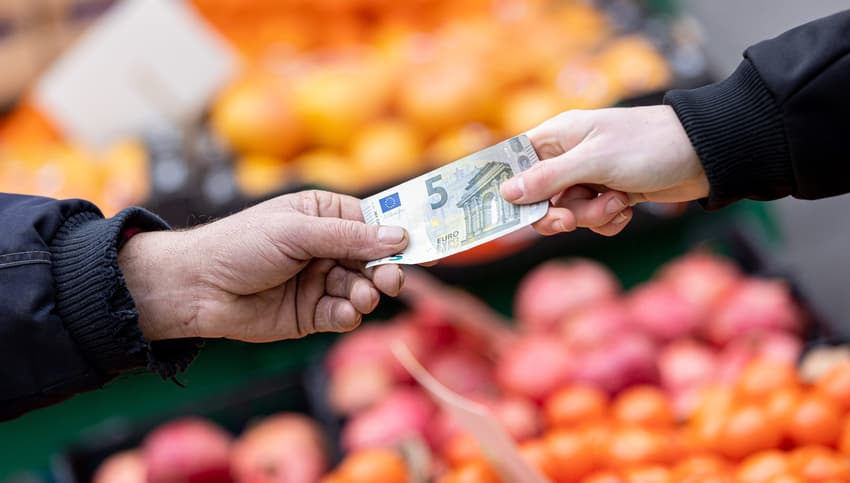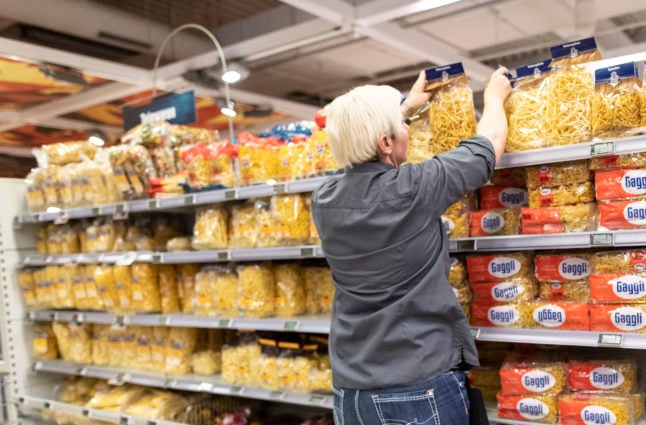EXPLAINED: The grocery products in Germany getting more expensive

Everyone is talking about consumer prices rising in Germany. What does it mean in real life?
Inflation keeps going up - and on Wednesday the Munich-based ifo institute, said it expected consumer prices to rise from 5.1 to 6.1 percent in March - which would be the steepest rise in consumer prices since 1982.
It comes as residents have already been feeling the pinch at the checkout (and on energy bills) over the last few months with the cost of living spiralling upwards. And Russia's war on Ukraine is exacerbating the issue further.
READ ALSO: German consumer prices set to rise steeply amid war in Ukraine
According to research by German site Focus Online and trade publications like the Lebensmittel Zeitung, several supermarkets are reacting by pushing prices up further.
Experts say that Aldi and Lidl tend to set the tone in German supermarkets because they are among the most important customers for the likes of farmers, manufacturers and distributors.
Last week, Aldi Süd and Aldi Nord increased the price of about 140 items in their standard assortment. Adding flavours, sizes and other variations of these items, the number quickly climbs to 400 products.
A spokesperson for Aldi Nord and Aldi Süd said the market had been strained for months by challenges including the Omicron wave of Covid-19, the international shortage of truck drivers and the increased costs for energy and raw materials.
READ ALSO:
- How the cost of living crisis is affecting everyday life in Germany
- Will Germany see a mustard shortage?
"The situation has been exacerbated by the war in Ukraine," said the spokesman. As part of the discounter model, Aldi reduces sales prices when purchase prices fall and increases sales prices when purchase prices rise.
"We would like to point out that our margins do not change as a result of this move," said the spokesman.
According to Focus Online, discounter giant Lidl also recently raised the prices of branded products, while there have also been noticeable increases at Rewe and Edeka.
Which products are you paying more for?
According to Focus, the prices of several food and drugstore items have massively increased since the end of January 2022.
Some of the price hikes on products include:
Pasta (up to 40 percent increase)

A supermarket employee in Offenburg stocks pasta in 2020. Pasta has been increasing in price in Germany. Photo: picture alliance/dpa | Patrick Seeger
Detergents (up to 20 percent)
Mineral water (over 10 percent)
Dairy products (up to 5 percent)
Coffee (up to 10 percent)
Paper handkerchiefs (up to 15 percent)
Toilet paper (up to 10 percent)
Kitchen roll (up to 20 percent)
Sunflower oil (up to 100 per cent)
READ ALSO: Germans urged not to panic-buy over shortage fears
In most cases, prices per product increased between five and 50 cents.
One example is mixed bio mince from Aldi Süd. While the 400-gram tray cost €3.59 in January, customers now pay €3.99 for it. At Rewe, customers now pay around €5.59 for mixed organic mince instead of €4.99 (January 2022).
The mineral water from own-brand Quellbrunn no longer costs 19 cents at Aldi, but a hefty 25 cents. Rewe seems to have followed suit. Those who put the mineral water from their label "Ja" in their shopping trolley now pay 25 cents for the 1.5-litre bottle at the checkout.
Meanwhile, price hikes for sunflower oil and rapeseed oil are particularly steep.
While last year customers paid between 89 and 99 cents for a bottle of oil, the product now costs up to €1.99 from some retailers. This is of course down to production and harvest stagnating because Russia is waging a brutal war against Ukraine.
A purchasing manager of a well-known discounter told Focus Online: "It's possible that customers will soon have to pay over three euros for a bottle of sunflower oil."
Comments
See Also
Inflation keeps going up - and on Wednesday the Munich-based ifo institute, said it expected consumer prices to rise from 5.1 to 6.1 percent in March - which would be the steepest rise in consumer prices since 1982.
It comes as residents have already been feeling the pinch at the checkout (and on energy bills) over the last few months with the cost of living spiralling upwards. And Russia's war on Ukraine is exacerbating the issue further.
READ ALSO: German consumer prices set to rise steeply amid war in Ukraine
According to research by German site Focus Online and trade publications like the Lebensmittel Zeitung, several supermarkets are reacting by pushing prices up further.
Experts say that Aldi and Lidl tend to set the tone in German supermarkets because they are among the most important customers for the likes of farmers, manufacturers and distributors.
Last week, Aldi Süd and Aldi Nord increased the price of about 140 items in their standard assortment. Adding flavours, sizes and other variations of these items, the number quickly climbs to 400 products.
A spokesperson for Aldi Nord and Aldi Süd said the market had been strained for months by challenges including the Omicron wave of Covid-19, the international shortage of truck drivers and the increased costs for energy and raw materials.
READ ALSO:
- How the cost of living crisis is affecting everyday life in Germany
- Will Germany see a mustard shortage?
"The situation has been exacerbated by the war in Ukraine," said the spokesman. As part of the discounter model, Aldi reduces sales prices when purchase prices fall and increases sales prices when purchase prices rise.
"We would like to point out that our margins do not change as a result of this move," said the spokesman.
According to Focus Online, discounter giant Lidl also recently raised the prices of branded products, while there have also been noticeable increases at Rewe and Edeka.
Which products are you paying more for?
According to Focus, the prices of several food and drugstore items have massively increased since the end of January 2022.
Some of the price hikes on products include:
Pasta (up to 40 percent increase)

Detergents (up to 20 percent)
Mineral water (over 10 percent)
Dairy products (up to 5 percent)
Coffee (up to 10 percent)
Paper handkerchiefs (up to 15 percent)
Toilet paper (up to 10 percent)
Kitchen roll (up to 20 percent)
Sunflower oil (up to 100 per cent)
READ ALSO: Germans urged not to panic-buy over shortage fears
In most cases, prices per product increased between five and 50 cents.
One example is mixed bio mince from Aldi Süd. While the 400-gram tray cost €3.59 in January, customers now pay €3.99 for it. At Rewe, customers now pay around €5.59 for mixed organic mince instead of €4.99 (January 2022).
The mineral water from own-brand Quellbrunn no longer costs 19 cents at Aldi, but a hefty 25 cents. Rewe seems to have followed suit. Those who put the mineral water from their label "Ja" in their shopping trolley now pay 25 cents for the 1.5-litre bottle at the checkout.
Meanwhile, price hikes for sunflower oil and rapeseed oil are particularly steep.
While last year customers paid between 89 and 99 cents for a bottle of oil, the product now costs up to €1.99 from some retailers. This is of course down to production and harvest stagnating because Russia is waging a brutal war against Ukraine.
A purchasing manager of a well-known discounter told Focus Online: "It's possible that customers will soon have to pay over three euros for a bottle of sunflower oil."
Join the conversation in our comments section below. Share your own views and experience and if you have a question or suggestion for our journalists then email us at [email protected].
Please keep comments civil, constructive and on topic – and make sure to read our terms of use before getting involved.
Please log in here to leave a comment.